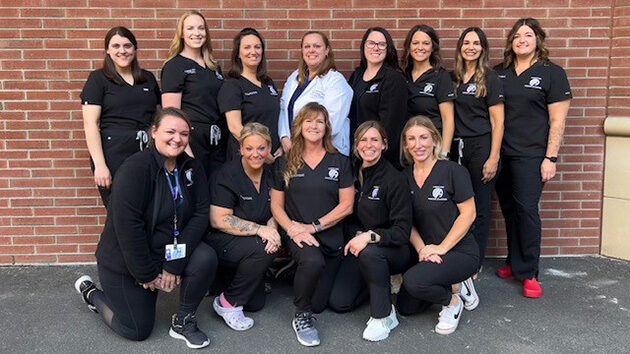Forensic Examiners Offer Informed Care, Resources to Survivors of Assault

Forensic Nurses Week, taking place this year from Nov. 6-11, recognizes nurses who specialize in treating victims of violence and providing them with compassionate, trauma-informed care.
Janica Kavoukian, RN, has worked at Albany Medical Center for the past decade and been a forensic examiner for one year. She said that the role has changed her practice and made her more perceptive to behaviors that could mean the patient is being victimized.
“I always say that I use my SAFE brain now,” Kavoukian said, referring to Albany Medical Center’s Sexual Assault Forensic Examiner (SAFE) program. “I look at things differently. Unfortunately, a lot of people just aren’t aware of the signs to look out for.
“Human trafficking victims, for example, may not look like what you expect. A woman may come in with her boyfriend, so you have to think—is he speaking for her? Is she reserved? A big one is when they say they don’t have a phone or they’re not from here and don’t have family locally. These are big red flags.”
Kavoukian and her colleagues are part of a larger team within the Department of Emergency Medicine. In March, Albany Medical Center’s forensic examiner program was elevated to the Division of Forensic Medicine, led by Division Chief Kirsten Morrissey, MD, and SAFE Program Manager Kaylin Dawson, RN. Becoming a division will allow the program to expand its services and help more people from local communities.
The forensic examiners treat patients of all ages from vulnerable populations, including those who are victims of sexual assault, human trafficking, maltreatment, and domestic violence.
“I became a forensic examiner so I could provide a voice and emotional support to this patient population on some of their darkest days,” said Melissa Springer, RN. “They are so vulnerable, and to be able to just be there for them is very rewarding.”
Melissa Ives, RN, said that when forensic examiners get called, there are steps to follow. She first calls the crime victim advocate, gathers what information she can from the primary nurse, and then introduces herself and the advocate to the patient. She explains why she is there and what services are available, all before getting the patient’s consent to do an exam, document any injuries, and collect evidence.
“Throughout the process, I’m counseling the patient on what I am doing and about prophylactic medications that might be available to them depending on the situation,” Ives said. The patient also receives a care bag with essential items such as clothes and toiletries as well as information about follow-up care and what comes next once they leave the hospital.
Consent is key during these exams. “The most important thing, from the moment you come in, is to make sure the patient knows this is their exam,” Kavoukian said. “We always tell them it’s a la carte. They get to pick the pieces they want, and if we start the exam, we can stop. We don’t want them to ever feel pressured.”
If the patient consents to having evidence collected, the examiners take extensive documentation, including photos, the patient’s history, DNA evidence, and wound measurements. The patient then has full authority over what to do with the evidence. They can opt to involve law enforcement, request the kit be held, or have it disposed of.
Training to become a New York State SAFE Department of Health certified examiner includes a 40-hour didactic course and preceptorship. Albany Medical Center examiners are also introduced to community partners such as rape crisis advocates and local law enforcement. The examiners will also meet with the district attorney’s office, which provides mock trial training to prepare examiners for testifying in court.
The forensic division has strong ties to the local community. In addition to connecting patients to victim advocates and local resources, Albany Medical Center and University at Albany partner for the We Care Project. During this annual event, which is sponsored by community organizations, volunteers pack bags with clothing of all sizes, toiletries, a teddy bear, and notes of encouragement. The bags are then given to patients who undergo forensic exams at Albany Medical Center.
Ives said that the one thing she wants survivors of assault to know is that help is available. “You have options. It’s OK to come to the hospital to see a provider even if you are not sure you want to press charges. We are here to help, and the sooner you get the hospital the most options we have available.”
Dawson added, “We realize it is often difficult for victims to take that step to seek out resources and assistance. Our forensic examiners are available to provide compassionate care to victims of violence in a non-retraumatizing way. Albany Medical Center is here to provide that specialized care for people who experience violence and hopefully help them on their healing journey.”